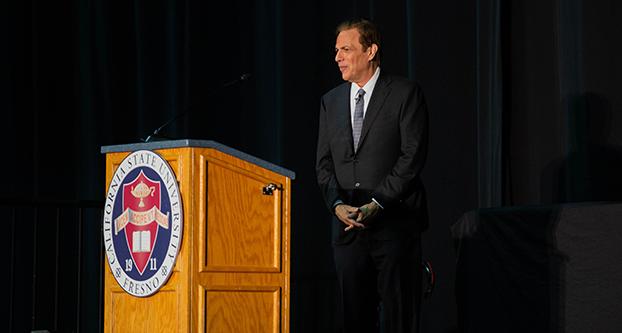George Washington “loved to be loved.” Abraham Lincoln had second thoughts on the Emancipation Proclamation. Harry Truman didn’t receive an elite education, and Lyndon B. Johnson’s knack for friendship helped him to pass the Civil Rights Act of 1964.
Those topics were discussed in-depth at “Leadership in American Politics,” a Save Mart Center lecture by presidential historian and best-selling author Michael Beschloss.
Beschloss revealed “another side” of former U.S. presidents and historical leaders and spent many minutes describing the “qualities of great presidents.” His lecture was part of Fresno State’s President’s Lecture Series.
Beschloss said that a president’s willingness to forfeit popularity, to make certain groups unhappy, their sense of history and ability to work with “the other side” are all key characteristics that lead to success in office.
He also outlined how presidents have “screw[ed] up,” including Franklin D. Roosevelt’s violation of Japanese-Americans’ civil liberties with Executive Order 9066 and Lyndon B. Johnson’s decision to send troops to Vietnam when there was no hope of winning the war, as he privately remarked.
Beschloss took the audience back in time to show the difference between seeing presidents in “real time” and researching them as a historian.
“Things that we are obsessed with in real time often times, I guarantee you, 40 years later will turn out trivial,” Beschloss said. “But also things 40 years from now we think were hugely decisive and important may be things that we don’t even know about in real time.”
He said that historical research takes about 40 years after a president leaves office to collect information that fully develops a president’s character and method of operating.
The research often includes letters, diaries and tape recordings. Beschloss said he used taped conversations from former President Johnson to help write his latest biography.
During a Q&A portion of the lecture, an audience member was curious as to how historians will view President Donald Trump’s presidency in the future.
“The honest answer is I don’t know,” Beschloss said. “As a rule of thumb” historians wait the 40-year period whether they like the president or not, he said.
Through his storytelling, Beschloss offered insight into presidents’ lives and terms, many which have only been read about in vague descriptions in history textbooks.




